A VPN (virtual private network) is an essential tool nowadays, regardless of which device you use. With the increased popularity of VPNs has come an increased number of VPN providers vying for your business. That makes finding the best one to suit your needs difficult. To help you sort out the right provider for you, we’ve committed to extensive research and testing of VPN services that cater to Mac owners in our guide to the top VPN services for Mac.
With the internet abuzz with privacy concerns and the potential changes coming to net neutrality, you’ve likely heard about VPNs before. When used correctly, a VPN can greatly strengthen your online privacy, assist in keeping your personal information secure, and even spoof your location in the world – allowing you to access websites or services that would otherwise be off limits due to region-locking.
Indeed, one of the most popular reasons to use a VPN outside the US is to get access to blocked online content, such as foreign Netflix libraries. With a VPN you can watch BBC iPlayer while outside of the UK, or access US Netflix from the UK, for example.
While Macs are generally considered to be more secure than PCs, VPNs are still useful for Mac users because it affects the connection between your Mac and the internet, rather than the computer itself.
If you subscribe to Apple’s iCloud+ you may be thinking you don’t need a VPN to hide your location and identity. Apple’s update for iCloud subscribers includes iCloud Private Relay, which sounds a bit like a VPN because it encrypts your web-browsing traffic and sends it through a relay to hide your location, IP, and any information about what you were browsing.
However, iCloud Private Relay is not a VPN because you aren’t able to choose an IP address or a region, and you won’t be able to make it look like you’re coming from another location. So you can’t watch geographically locked Netflix content, for example. Read more here: iCloud+ Private Relay explained.
Our current favourite service is Surfshark, which is a well-priced all-rounder. But below you will find the top VPN services for Mac.
Right now nearly all the VPN services are doing huge Black Friday/Cyber Monday sales, so it’s a great time to subscribe!
PROMOTION
Grab the best Black Friday VPN deal now
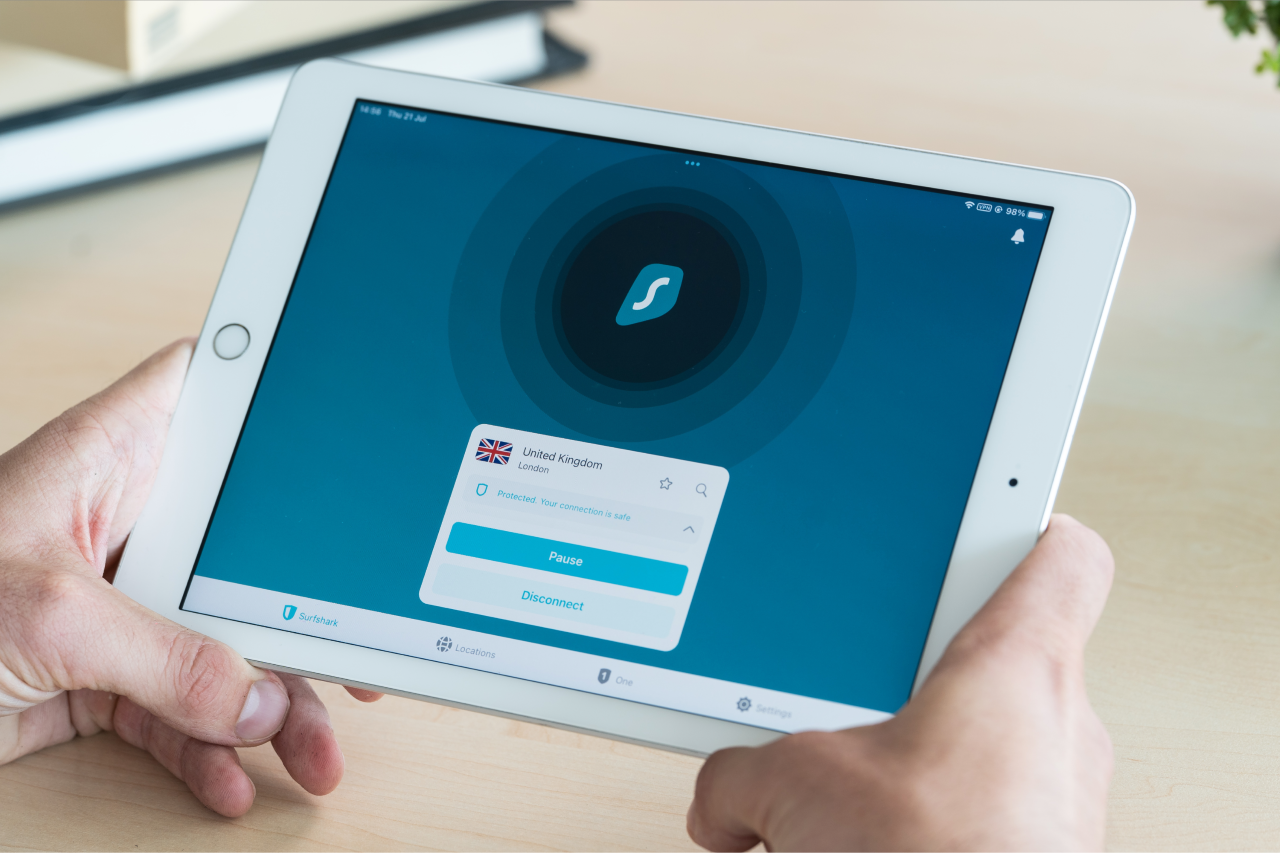
Enjoy two years of Surfshark VPN this Black Friday for $2.22 a month, plus get two extra months for free (all rounded to $2.05/mo)! Explore the internet safely on unlimited devices without overpaying.
Best VPN for Mac
- Best all-rounder: Surfshark
- Best premium: ExpressVPN
- Most features: NordVPN
- Most countries: PureVPN
- Most servers: Private Internet Access
Most of these will cost less than $5/£5 per month, with some less than $3/£3. There are free VPNs available, but beware that some severely restrict which servers (and therefore countries) you can connect to and the amount of data you can download through those servers. You may be able to save money if you take a look at our round up of VPN deals
It’s also important to read the terms and conditions before using a free VPN, as in rare cases they sell your data to third parties to offset the cost of you using it without paying. It’s a bigger problem on iPhones and Android where unscrupulous companies try to cash in on the VPN ‘gold rush’ and offer up poorly put together apps. Stick with our recommendations and you’ll be safe from these, though.
VPN apps very easy to install and use but for a step-by-step guide, read how to set up a VPN on a Mac.
All of these VPNs will also work on your iPhone and iPad as well, but you might want to check out our separate guides to the best VPNs for iPhone and best VPNs for iPad.
Best VPNs for Mac: Reviewed & Ranked
1. Surfshark

Pros
- Fast WireGuard speeds
- Unlimited devices and connections
- Easy to use
Cons
- No split tunneling on macOS
- Kill switch can’t be customised
Surfshark is a great-value VPN that offers a lot more than you’d expect for a small monthly price.
Its apps are easy to use and it reliably unblocks streaming services such as Netflix and BBC iPlayer. It’s missing the specialty servers offered by rivals such as NordVPN, though.
Connection speeds are very impressive, and that’s thanks to the use of the WireGuard protocol. You really won’t notice any slowdown in your internet speed when Surfshark is running, so long as you have WireGuard selected and aren’t using servers the other side of the globe.
The company has upgraded all its servers so they run entirely in RAM, just like NordVPN and ExpressVPN. It’s also a member of the VPN Trust Initiative, while two-factor authentication (2FA) is a feature few VPN services offer.
The other reason to consider Surfshark is because it undercuts almost all of its rivals on price, yet doesn’t place any limit on the number of devices you can use simultaneously.
So you can install and use it across many devices including your Mac, PC, Android and iOS devices, as well as browsers.
There’s a kill switch, a strict no-logs policy and a Multi-Hop feature which routes your connection via two VPN servers for an extra layer of protection. However, there’s no split tunneling or GPS spoofing on the Mac.
- 3200+ RAM-based servers
- Multi-Hop connections
- Unlimited simultaneous connections
- 24/7 customer service
- Two-factor authentication
- GPS spoofing (Android only)
2. NordVPN

Pros
- Easy to use
- Impressive WireGuard speeds
- Lots of servers
Cons
- No split tunneling on macOS
- Two separate apps can be confusing
NordVPN is one of the biggest and best-known VPN services. It sat firmly at the top of this list for years until Surfshark pipped it to the post. NordVPN is easier to use than Surfshark and has a more up-to-date independent audit. It also has speciality servers for specific purposes. But Surfshark is cheaper, offers unlimited connections and has more in-depth double VPN features.
There are more than 5,000 servers available across 59 countries. You won’t have to figure out which one to choose thanks to the handy ‘Quick connect’ feature that picks the server best suited to your needs.
Connections are fast and reliable, and NordVPN unblocks popular streaming services around the world including Netflix and BBC iPlayer. You can connect up to six devices simultaneously.
Recently Nord has added support for the faster WireGuard protocol, making it one of the fastest VPN services out there. However, it’s only available on the ‘IKE’ version of the app, which only offers a permanently enabled kill switch. To have more control, you’ll need to download the ‘OpenVPN’ version, albeit with slightly slower speeds.
- 6 simultaneous connections
- 24/7 tech support
- Kill Switch
- Works with Netflix & other streaming services
You can get 68% off the usual monthly price if you take advantage of the two-year plan. However, there’s no split tunneling on the Mac version.
3. ExpressVPN

Pros
- Easy-to-use desktop program
- Broad device support
- Excellent speeds
Cons
- ExpressVPN’s team is largely anonymous
- Expensive
ExpressVPN is one of the most accomplished VPN services you can buy. Everything you’d expect from a modern VPN is here, including an effective kill switch, impressive device support and split tunneling for app-by-app protection. Although the latter doesn’t yet work on macOS Big Sur, it is extremely easy to set up, with quick access via the menu bar one of the highlights.
ExpressVPN has often led the way when it comes to security, but other providers are quickly catching up. It’s no longer the only one with RAM-based servers, while solid device and tech support are the norm whichever service you use.
The new Lightway protocol looks set to deliver big increases to the speeds ExpressVPN is capable of, but as open-source technology many similar services will be able to make use of it. Many of these are significantly more affordable.
With the introduction of Apple Silicon, there’s no doubt that ExpressVPN is more than capable of serving the next generation of Mac. It’s just not the only one.
- Kill switch (Network Lock)
- 5 simultaneous connections
- 24/7 customer service
- Works with Netflix & other streaming services
4. VyprVPN

Pros
- Fast WireGuard speeds
- Very easy to use
- Unblocks Netflix and BBC iPlayer
- Low starting price
Cons
- Comparatively few servers
- Not clear which servers are virtual
- Patchy support experience
VyprVPN offers everything most people are looking for in a VPN, without needing to spend much money.
You get fast WireGuard speeds, alongside separate protocols focused on reliability, anti-censorship and ease of use. It’s also excellent at unblocking geo-restricted content, whether that’s local versions of Netflix or BBC iPlayer & ITV Hub from outside the UK. Premium features such as split tunneling and a kill switch are here too, even if the latter can’t be customised.
VyprVPN’s no-logs policy has been independently audited, and the service adheres to a strict Privacy Policy from parent company Golden Frog. More than 700 servers in over 70 countries should be plenty for most people, although there’s often only one per country. It’s also not clear which of these are physical and virtual.
- Kill switch and split tunneling
- WireGuard protocol means fast speeds
- 30 simultaneous connections
- Works with Netflix & other streaming services
Nonetheless, it’s still speedy, reliable and affordable – especially if you don’t mind subscribing for three years. That 36-month plan will set you back just $1.81/£1.36 per month, representing excellent value for money.
5. FastestVPN
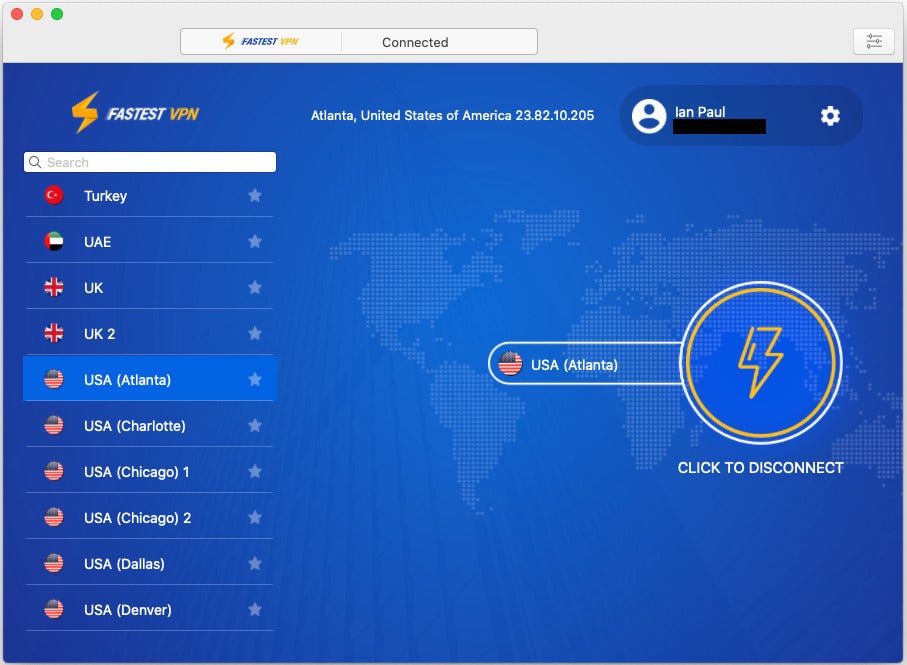
Pros
- Affordable pricing
- Good speeds
- 10 simultaneous connections
Cons
- Limited compared to the Windows app
- Limited VPN protocol options
This easy-to-use, attractive, and uncomplicated app is a great option for VPN newbs. In addition to its straightforward and uncluttered design, FastestVPN also offers good speeds and a sufficiently expansive network. It’s icing on the cake that its privacy policy is easy to understand and makes all the right promises.
In our tests, FastestVPN maintained about 30 percent of the base speed across five locations on multiple test days, although there were some weak spots in Asia and Australia.
- Supports 10 simultaneous connections
- 32 country connections with more than 250 servers
- Internet kill switch blocks all online traffic if VPN connection drops
Despite it’s name it’s not the fastest VPN, but FastestVPN does make the right privacy promises in a way that’s easy to understand.
6. ProtonVPN
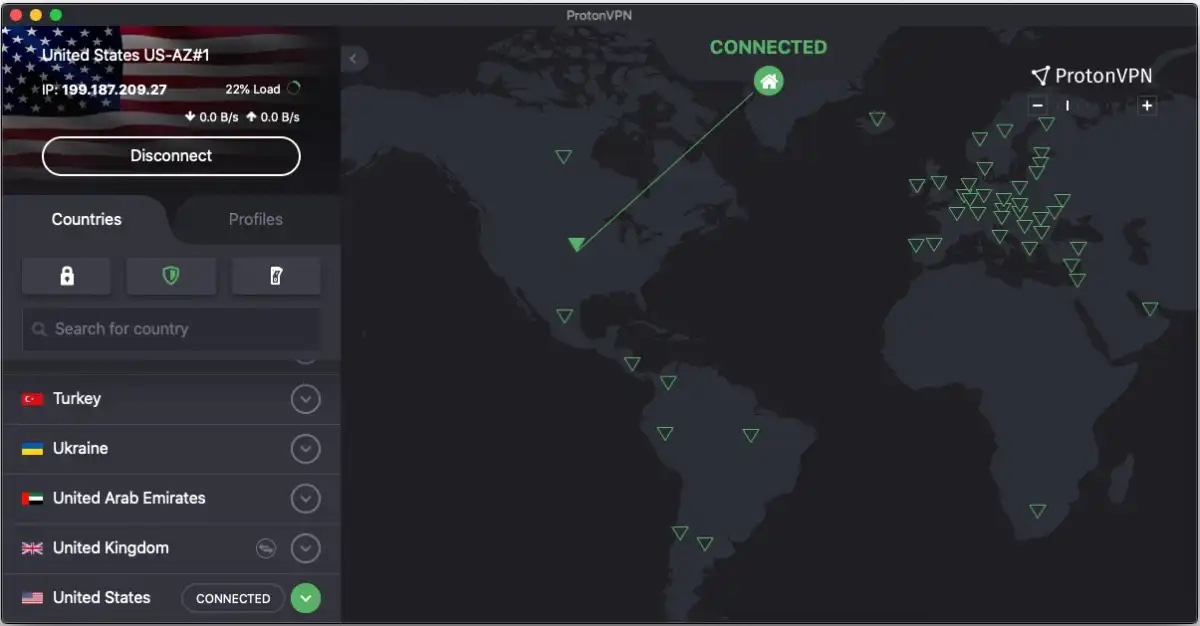
Pros
- Easy-to-use software interface
- Secure Core helps hide your location
- Built-in malware and tracker blocker
- One of the fastest we’ve tested on a Mac
Cons
- A few occasions where Netflix didn’t work
ProtonVPN is an impressive VPN. It starts with a free tier with very limited features, is easy to understand, offers a collection of interesting features and great speeds.
- 55 country options
- Includes NetShield malware and tracker blocker
- Internet kill switch option
- Works with Netflix and other streaming services
- One of the fastest VPN we’ve tested on macOS
ProtonVPN is a ProtonVPN starts with a free tier with very limited features is an excellent service with fast speeds, the right privacy promises, a good amount of features including support for streaming services, and fair pricing. It’s well worth a look.
7. CyberGhost

Pros
- Impressive WireGuard speeds
- Dedicated downloading and streaming servers
- Affordable
Cons
- No split tunneling on Mac
- No recent audit
- Didn’t unblock BBC iPlayer
CyberGhost is one of the biggest names in the VPN industry. It’s affordable and user friendly, so is perfect for anyone using a VPN on their Mac for the first time.
Like certain rivals, it is constantly adding new servers and the current tally of over 6700 in 88 countries means you should always be able to get a fast connection. And in our tests, we’ve always seen great speeds from CyberGhost, especially following the introduction of the WireGuard protocol.
It works with phones, tablets, browsers and of course your Mac.
- 6700+ servers
- 7 simultaneous connections
- 24/7 customer service
- Kill switch
It’s not perfect, though – there’s no split tunneling on the Mac, no evidence of a recent independent audit of security credentials and a user experience that’s slightly rough around the edges. It also didn’t unblock BBC iPlayer in our testing.
Still, at $2.25/£1.99 per month for 3-year deal (which currently gives you three months’ extra free), it still represents very good value for money.
8. Private Internet Access

Pros
- Lots of servers
- Fast WireGuard speeds
- Split tunneling works well
- Unblocks BBC iPlayer
Cons
- Clunky Mac app
- No independent audit
- Based within 14-eyes
- Doesn’t unblock ITV Hub
Private Internet Access (PIA) is a compelling VPN at a relatively affordable price, making it a great option for the Mac.
It has an incredible 33,665 servers across 73 countries – that’s far higher than almost any consumer VPN service. These include all the most popular locations, with the option for up to 10 simultaneous connections.
Speeds are excellent, thanks to the recent introduction of the WireGuard protocol. PIA also benefits from a kill switch and split tunneling, features that are sometimes left out of Mac VPN services.
It allows you to access international versions of Netflix, as well as BBC iPlayer while outside the UK.
The service doesn’t log any of your details or activity, so even though it is based in the US, there’s no data to hand over should the authorities order PIA to do so.
- 33,000+ servers
- 10 simultaneous connections
- 24/7 customer service
- Kill switch and split tunneling
However, it’s not perfect. There’s no evidence of an independent audit and the Mac app is clunky in comparison to some rivals.
Nonetheless, PIA is a solid VPN service at an affordable price. A two-year subscription works out at only $2.91/£2.37 per month. You also currently get two months extra for free.
9. Hide.me

Pros
- Fast WireGuard speeds
- Dedicated streaming servers
- Impressive free tier
Cons
- Slightly clunky UI
- No recent independent audit
- Premium plans are expensive
Hide.me is another VPN service which has improved considerably in recent years.
As well as offering a completely free version (which none of its rivals here do), it has also added WireGuard, which is considerably faster than other encryption protocols.
Other key features include a customisable kill switch and split tunneling, as well as a Stealth Guard which stops selected apps from running without the security of a VPN connection.
It can unblock Netflix and allows you to access BBC iPlayer from outside the UK. There’s also solid device support, with up to 10 simultaneous connections permitted.
- 1900+ servers in 47 countries
- Kill switch
- Split tunneling
- 24/7 live chat
- 10 simultaneous connections
- Free version
However, the user interface on Mac is a bit clunky, and we’re still waiting for an update to the 2015 no-logs policy certification.
10. Malwarebytes Privacy VPN (Mac)
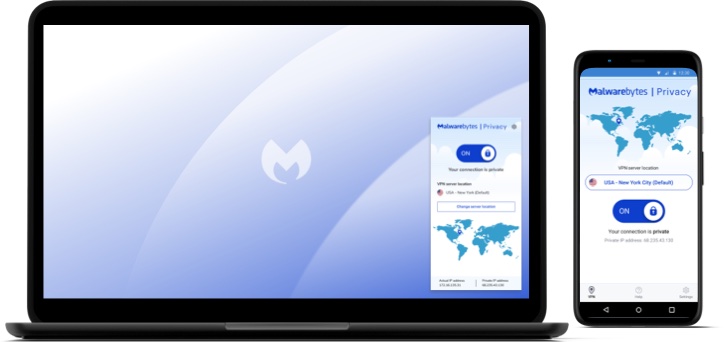
Pros
- Easy to use and understand
- Supports WireGuard protocol
- Clear privacy policy
Cons
- Not a lot of features
- Other VPNs have more anonymity features
Malwarebytes, probably best known for antivirus software and advice, also offers a standalone VPN service called Malwarebytes Privacy. It’s an easy to use app with the right kind of privacy promises – as you’d expect from a respected name in security based in the U.S.
- Offers 32 country locations
- More than 245 servers
In our tests Malwarebytes was a mid-tier performer in terms of speeds, but it should be good enough for most casual users.
Malwarebytes Privacy VPN does a good job and, starting at $3.33/£2.50 a month for one device, the price is right.
11. PureVPN

Pros
- Lots of servers
- Impressive security credentials
- Unblocks iPlayer u0026amp; ITV Hub
Cons
- No WireGuard on Mac
- No split tunneling on Mac
- Kill switch can’t be customised
PureVPN is a service to consider if you need to connect to one or more of the countries which aren’t covered by its rivals.
There are more than 2,000 servers available across 141 countries (the most of all services listed here).
However, some of those are achieved using virtual server locations. Virtual servers are usually rented from a datacentre, which means the VPN company may have less control over them. PureVPN is transparent about which servers are virtual and which are physical – you can see a small ‘v’ next to each virtual server on the PureVPN website. Unfortunately Mac users do not see this information in the app though, whicle their PC counterparts to.
Virtual servers will still unblock content as you’d expect. You can also take advantage of the following:
- Kill switch in macOS app
- 140+ countries covered
- 5 simultaneous connections
- 24/7 customer service
- Works with Netflix & other streaming services
PureVPN used to log session information but these days operates a strict no-logs policy.
Standard monthly pricing isn’t that attractive for any VPN service, but like its rivals PureVPN always offers great deals if you’re happy to sign up for multiple years.
You can find out more in our full PureVPN review, and see PureVPN offers here.
12. Ivacy

Pros
- Decent speeds
- Unblocks iPlayer, ITV Hub and more
- Good range of customer support
Cons
- Only IPSec protocol on Mac
- No split tunneling or kill switch on Mac
- No independent audit
Ivacy is a well-established VPN service which offers apps for macOS, iOS alongside other devices you may own. Its network isn’t the largest, but still offers servers in all the countries you are likely to want to pretend to be located in.
- Singapore headquarters
- Over 3,500 servers in over 100 countries
- 5 simultaneous connections
- Unblocks local versions of Netflix and BBC iPlayer
Speeds are decent, and support is responsive via 24/7 live chat. And with amazingly low prices, it’s a solid choice. However, the Mac app is a pale imitation of the Windows version, with only one protocol available on Mac, plus you miss out on split tunneling and a kill switch.
How we tested VPNs
For each VPN service we review, we conduct tests at three different times of the day: morning, afternoon, and evening, using Ookla Speedtest. We start by measuring the speed of our unprotected internet connection before testing the upload/download speeds of the VPN service. These tests are conducted to servers located in North America, the UK, Europe, Oceana, and Asia over an ethernet connection with a service provision of 100Mbps.
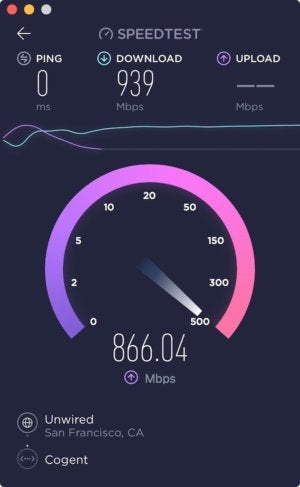
Ookla Speedtest
To test upload and download speeds, we close down all background internet processes on the Mac, using TripMode. The only traffic on the system able to upload or download any data is Ookla. We use this setup to ensure that the numbers that Ookla produced were not stymied by anything else that the computer may have been doing at the time. The speeds Ookla captured were then averaged, providing us with a final numeric score.
We then use those scores to calculate a percentage of difference in speeds, which is what you’ll see in our reviews. Since internet speeds change constantly based on server load, how fast your connection is, and a gazillion other factors, we feel this provides a better picture of what you can expect from a service, on the whole, than merely quoting the exact upload/download speeds we encountered during testing.
Speed isn’t the only quantifiable metric that we look at. The number of countries that a VPN offers servers in, total number of servers worldwide, and how much it’ll cost you to connect to those servers on a monthly or annual basis are also taken into consideration when recommending a VPN service to you.
Additionally, we conduct hours of research into the VPN providers to find out who owns them, where they’re based, what they do with subscriber information, and whether the provider has a track record of questionable business practices.
What’s a VPN?
VPN stands for virtual private network. If you’re not using a VPN, when your computer connects to the internet, it does so through the local gateway provided by your internet service provider (ISP). Doing this allows you to connect to all of the online services you use everyday.
However, connecting this way also allows an ISP to know your physical location based on where you access the internet—be it at home, at work, in a cafe, or at a public Wi-Fi hotspot. This information is often sold to marketers and other parties interested in getting to know more about you and your browsing habits.
Worse still, if you connect to the internet through an access point with weak security, such as at an airport, mall, or local library, hackers connected to the same network could intercept personal information like your social media passwords or banking credentials through what’s called a man-in-the-middle attack. A VPN service can help prevent all of that.
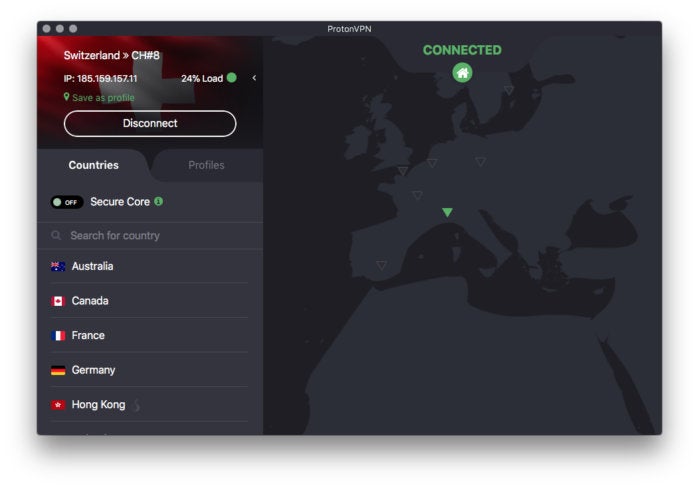
A good VPN should allow for server connections around the globe.
A VPN creates an encrypted digital tunnel between your computer and the server of the VPN service you choose to use. Once this tunnel has been established, your web searches, the sites you access, and the information you submit online will be hidden from prying eyes. This means that your ISP can’t log or sell your information and hackers using the same network as you will find it difficult to initiate an attack on you. Almost no one will have any idea of what information you’re accessing.
What a VPN can’t do
A VPN can’t protect you from viruses, malware, or ransomware attacks if you choose to download an infected file, or a visit site designed to inject your computer with malignant code. It won’t keep spoofed sites from stealing your personal information, if you happen to visit one. So, you’ll want to bone up on online security best practices.
You should know that while using a VPN will allow you to anonymously engage in peer-to-peer file-sharing/torrenting, some service providers may cancel your VPN subscription or turn over your information to the authorities if they catch you trading copyrighted material with others.
What to look for in a VPN
A clear privacy policy. A good VPN should offer an easy-to-understand privacy policy that outlines what, if any, information the company collects from its users. It’s important that this policy details what they do with this information. Some VPN providers, especially those that offer their services for free, sell their user information to advertisers and other interested parties, just like an ISP does. Choose a provider that offers a level of privacy that suits you.
Know where the provider is based. Many countries have no laws demanding that VPN providers maintain logs of their users’ activity. This makes maintaining your privacy more assurable than it would be if you use a VPN located in a country that requires that user-activity records be maintained. Some companies, in an effort to make their network of servers look bigger or more varied than it actually is, spoof the locations of their servers.
The more servers, the merrier. Choosing a VPN provider with a ton of servers around the world is important for a couple of reasons. First, having a multitude of servers to choose from means that you won’t be forced to connect to an overpopulated server where the data flows like mud.
Second, having a wealth of servers to choose from both at home and internationally means more opportunities for spoofing your location, allowing you to hide where you are or access region-locked content with ease.
Multiple payment options. It’s a vicious circle. Paying for a VPN with a credit card online before you have access to a VPN could allow your financial information to fall into the wrong hands. Look for providers that offer alternative payment options such as PayPal, Bitcoin, AliPay, or via the Mac App Store.
An easy-to-use interface. It takes a lot of digital wizardry to connect to a VPN. Some people want to see how their VPN operates, behind the scenes. Using an open source VPN client like Tunnelblick is great for this. Most folks, however, just want their VPN to work with minimal frustration. Look for a VPN service that offers a Mac client with an easy-to-use interface.
Protection for all of your devices. A good VPN service will offer licenses for multiple devices to protect your loved ones’ computers as well as your personal smartphone and tablet. To this end, before investing in a VPN subscription, make sure that it provides software clients for all of the devices you own.





